Elections 2012
•
Fight for the Vision of the Working Class
• Democratic National Convention: Obama's "Choice Between Two Different Paths"
• The Obama-Clinton Alliance
•
Republican National Convention: Romney's Conception of the Right Direction for America
Fight for the Vision of the Working Class
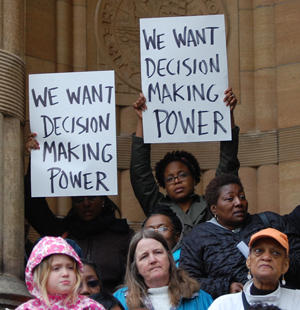 The 2012 presidential elections are in full swing, with both Democrats and Republicans having held their conventions. Both President Barack Obama and Republican candidate Mitt Romney emphasized that they have different proposals for America. They also made clear, however, that they are different proposals headed in the same direction, a direction that favors the rich and their continued rule over the country. It is a direction that favors and protects the monopolies while trampling on the public good.
The 2012 presidential elections are in full swing, with both Democrats and Republicans having held their conventions. Both President Barack Obama and Republican candidate Mitt Romney emphasized that they have different proposals for America. They also made clear, however, that they are different proposals headed in the same direction, a direction that favors the rich and their continued rule over the country. It is a direction that favors and protects the monopolies while trampling on the public good.
Elections are supposed to be a time for debate and finding solutions to the problems faced by society. Yet the vision of the working class, for a new direction for the economy and political affairs, is not to be discussed. Everyone is to remain within the confines of the one direction promoted, that to “out-educate and out-compete” against fellow workers worldwide in a manner that keeps the U.S. rulers on top. We are only to discuss whether Romney or Obama can do that better. It is much like the debate of the old choice of the “one big happy family” Fed Ex model or the “one uniform, one boss,” UPS model. They are different. But remaining within that debate serves the rulers and blocks the necessity to debate, discuss and advance the vision of the working class for society.
A new direction for the economy and political affairs that puts the rights of the working class and people center stage is the necessity of the times. Let the elections be a time to debate and elaborate this new direction and how to achieve it. Certainly to head in this new direction, the working class needs its own thinking, its own independent politics advancing its vision for society. Such a society is one in the image of the working class with its qualities as the new rising class, organized on a collective basis and taking up social responsibility for society.
Take for example the existing electoral set-up. It is one that excludes the people from power. It marginalizes their concerns and buries their vision under the chauvinism of the U.S. rulers, who demand that all stand loyal to them and their drive for world empire. Obama and Romney emphasized this in their speeches.
As well, the broken and undemocratic character of the existing political set up may be described, as Obama did, but it is not to be dealt with. Even the most minimal of changes, such as equal participation for third parties and public funding of the electoral process, not the candidates, is not to be addressed. Why not? Why instead are we bombarded with the irrational demand to accept an electoral set up that all agree is broken? It is irrational to submit to such a debate.
A political system that marginalizes and blocks the people from power at a time when they need to be center stage as decision-makers is outdated and undemocratic There is a necessity for change. To occupy that space for change, it is necessary to fight for the vision of the working class, to debate and organize for a new direction for the economy and political affairs. Let the 2012 elections be an arena for such debate and organizing.
[TOP]
Democratic National Convention
Obama's "Choice Between Two Different Paths"
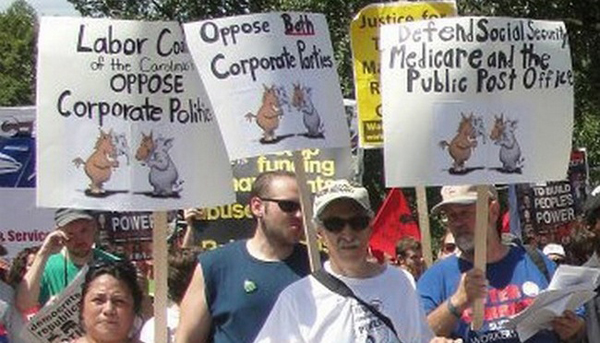
Protest at the Democratic National Convention in Charlotte, North Carolina
The Democratic Party held its 2012 Convention in Charlotte, North Carolina from September 4 to 6. President Barack Obama began his speech at the Democratic National Convention by describing the broken nature of the existing electoral system when it comes to providing an informed vote and equal access: "I know campaigns can seem small, and even silly sometimes. Trivial things become big distractions. Serious issues become sound bites. The truth gets buried under an avalanche of money and advertising. If you're sick of hearing me approve this message, believe me, so am I." He did not however offer any proposals to change this set up in a manner that favors the people. Instead he emphasized "When you pick up that ballot to vote, you will face the clearest choice of any time in a generation. Over the next few years, big decisions will be made in Washington, on jobs, the economy; taxes and deficits; energy, education; war and peace, decisions that will have a huge impact on our lives and our children's lives for decades to come. And on every issue, the choice you face won't be just between two candidates or two parties. It will be a choice between two different paths for America."
There is little doubt big decisions will and are being made. And that Obama and Romney offer different proposals for the current problems society faces. What is absent however is any proposal for a new direction for the economy and political affairs. Decisions are being made that have a huge impact on people’s lives, yet they have no control over these decisions — the existing set-up does not permit the will of the majority on issues like war and peace and the economy to carry any weight. It blocks decision-making by the people and guarantees that while Obama and Romney offer "two different paths," they are paths headed in the same old direction of a society of, by and for the rich.
Like Romney, Obama attempts to use U.S. chauvinism to rally people to his side, saying Americans work "harder and smarter than anyone else," and that "Together, I promise you, we can out-educate and out-compete any nation on earth." Teachers certainly do not become teachers to take up this chauvinist aim of beating down and oppressing Chinese, Indian or German children or children of any nation. On the contrary, working people of the U.S. seek relations of mutual respect and benefit with their fellow workers abroad. They share a common fight for rights, not to "out-compete" each other.
The content of "out-educate and out-compete" means ensuring U.S. success in the global economy. It means empire building in social, psychological, economic and political terms. It is no doubt for this reason that the paths of Obama and Romney have in common that, "We will sustain the strongest military the world has ever known," (Obama) and "We will preserve a military that is so strong no nation would ever dare test it," (Romney).
Obama and Romney also share in common the preservation of the "free enterprise system," which today is a system of monopoly capitalism. Obama put it this way: "We honor the strivers, the dreamers, the risk-takers, the entrepreneurs who have always been the driving force behind our free enterprise system, the greatest engine of growth and prosperity the world has ever known."
Not a few listening to Obama's speech picked up on the difficulties he and the ruling circles he represents face in providing anything new or even serious in terms of solutions. Obama reiterated several times what has now become a stale slogan: "If you believe in a country where everyone gets a fair shot, and everyone does their fair share, and everyone plays by the same rules, then I need you to vote this November."
Whatever anyone may believe, this content certainly clashes with reality. Inequality is increasing, workers have done far more than "their fair share" while getting far less in wages, pensions and health care. And the monopolies do not play by rules — a contract is no longer a contract, phony lockouts are commonplace and bankruptcies are used as legal theft of the legitimate claims of the workers on the wealth they produce. How can this slogan that reflects the old social contract be believed when that arrangement is finished?
Perhaps most significant about Obama's speech is his effort to speak to the ruling circles as to why he should continue to be their champion. He says, "Our problems can be solved. Our challenges can be met." He adds, "You can choose leadership that has been tested and proven." He presents himself as better able to handle foreign affairs and to convince working people to accept the path of defending the U.S. Empire. He does this in part by jumbling together different forces and then saying none are to blame for problems and "we" the ruling circles and "we" the people are all in this struggle together. "We don't think the government can solve all our problems. But we don't think that the government is the source of all our problems, any more than are welfare recipients, or corporations, or unions, or immigrants, or gays, or any other group we're told to blame for our troubles. Because America, we understand that this democracy is ours. We, the People, recognize that we have responsibilities as well as rights; that our destinies are bound together; that a freedom which asks only what's in it for me, a freedom without a commitment to others, a freedom without love or charity or duty or patriotism, is unworthy of our founding ideals, and those who died in their defense."
Patriotism and duty thus become military service and making sure the unions, welfare recipients, immigrants, gays and others all line up behind the rich in their striving for world empire. The majority, working people, are to be diverted from the reality that this so-called democracy and its electoral system is not under their control and does not serve their interests. They are not the ones in control and need to sort out how to win political power so that they are.
Protests at Democratic National Convention
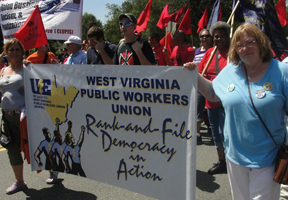
![]()
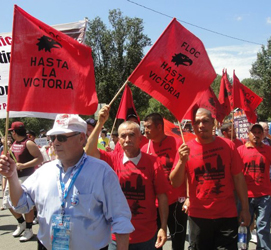
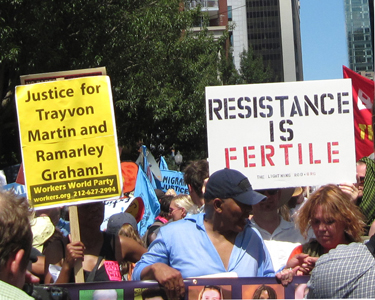
![]()

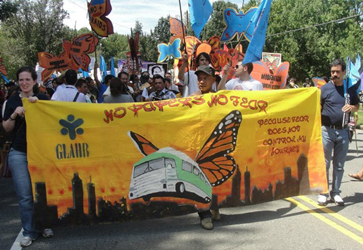
![]()

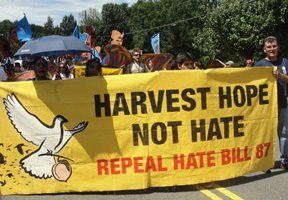
![]()

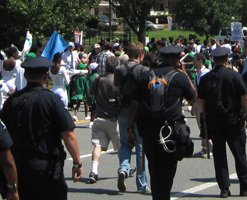
![]()
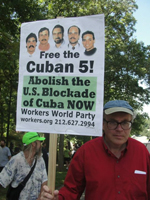
![]()
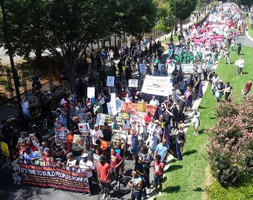
[TOP]
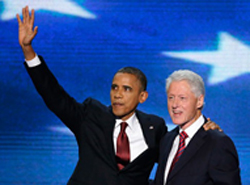 President Barack Obama called on former President Bill Clinton to nominate him at the Democratic National Convention, and he did so. An alliance has clearly been struck and a deal of some kind made, as Clinton was enthusiastic to participate. He especially emphasized why Obama should be the one to govern and be elected. It is likely that as the police powers of the presidency continue to expand and arrangements of governance serving to greatly lessen and even eliminate the role of Congress, including for the budget are consolidated, some form of dual-presidency that includes the former president and his wife, current U.S. Secretary of State Hillary Clinton, will have a place. This team is seen as the winning combination to preserve the union and keep the people's resistance in check.
President Barack Obama called on former President Bill Clinton to nominate him at the Democratic National Convention, and he did so. An alliance has clearly been struck and a deal of some kind made, as Clinton was enthusiastic to participate. He especially emphasized why Obama should be the one to govern and be elected. It is likely that as the police powers of the presidency continue to expand and arrangements of governance serving to greatly lessen and even eliminate the role of Congress, including for the budget are consolidated, some form of dual-presidency that includes the former president and his wife, current U.S. Secretary of State Hillary Clinton, will have a place. This team is seen as the winning combination to preserve the union and keep the people's resistance in check.
In elaborating on governance, former President Bill Clinton said, "We think 'we're all in this together,' is a better philosophy than 'you're on your own.'" He added, "When times are tough, constant conflict may be good politics but in the real world, cooperation works better. Unfortunately, the faction that now dominates the Republican Party doesn't see it that way. They think government is the enemy and compromise is weakness." He too repeated the old slogan of a "nation of shared opportunities, shared prosperity and shared responsibilities." And he concludes that the union can be preserved if "we're all in it together." He said, "I know we're coming back. For more than 200 years, through every crisis, we've always come out stronger than we went in. And we will again as long as we do it together. We champion the cause for which our founders pledged their lives, their fortunes, their sacred honor — to form a more perfect union."
Obama also addressed his governing plans in an interview with the Associated Press before the convention. When asked what he would do if he wins and the Republicans retain control of the House, Obama said he expects the Republicans to listen to the American people, who in electing him "will have cast a decisive view on how we should move the country forward." He added, "Republicans will have to make a very concrete decision about whether they're willing to cooperate on a balanced package," for the deficit, budget cuts and so forth. Then he emphasized, "If they don't, then I'm going to have to look at how we can work around Congress to make sure that middle-class families are protected, but that we're still doing our — meeting our responsibilities when it comes to deficit reduction and investing in the future."
He said the majority, including a lot of Republicans agree with this "balanced approach." He also expressed his readiness to compromise: "I'm prepared to make a whole range of compromises, some of which I get criticized from the Democratic Party on, in order to make progress. But we're going to need compromise on your side as well. And the days of viewing compromise as a dirty word need to be over because the American people are tired of it." He again targeted Congress saying the need for compromise is "a message that will resonate not with every Republican, but I think with a lot of fair-minded Republican legislators who probably feel somewhat discouraged about having served in one of the least productive Congresses in American history."
It is apparent, from remarks by Romney, Clinton and Obama, that the ruling class is concerned about preserving the union in conditions where the conflicts among them are intensifying and the old arrangements, including party structures and Congress as an arena for resolving conflict, are disintegrating. Obama and Clinton are emphasizing the need for compromise and isolating those who refuse to do so, whether Democrats or Republicans. And there is the threat that Obama will go around Congress and implement more of the broad executive powers, such as those involving control of food, energy, commerce and use of the military against Americans inside the country.
While it is not clear what deal was struck for Obama to secure Clinton's support, what is clear is that this team and the forces they represent are calling for compromise within the ranks of the ruling class while also preparing to usurp yet greater power.
[TOP]
Republican National Convention
Romney's Conception of the Right Direction for America
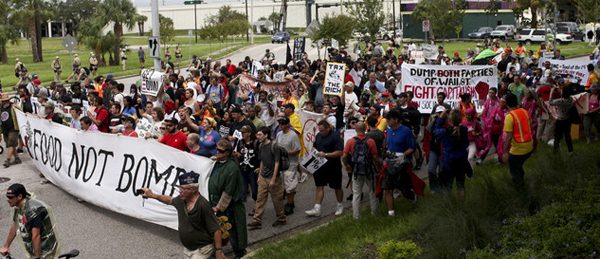
Demonstration at Republican National Convention, Tampa, Florida
The 2012 Convention of the Republican Party was held in Tampa, Florida from August 27 to 30. In his speech to the Republican National Convention accepting his nomination for president, Mitt Romney spoke to a problem both candidates face: the majority of Americans doubt their children will have a better future. Working people are contending with the fact, backed up by their experience, that the U.S. economy and political set up can no longer deliver on the American Dream. The necessity for a new dream, a new direction that favors the people is presenting itself. Blocking this new direction is an important part of the elections for the ruling circles so as to maintain the status quo. Hence talk of the "right" direction is a main topic of the candidates.
Romney attempts to deal with the necessity for a new direction by invoking the chauvinism of the U.S. ruling circles, that the U.S. is the "greatest country in the history of the world." He says Americans have a "unique blend of optimism, humility and utter confidence that when the world needs someone to do the really big stuff, you need an American." Evidently Romney thinks such chauvinism will overcome the growing sentiment among workers that their path is not to join the rulers in the "really big stuff'" of empire building and "out-competing" their fellow workers worldwide, but rather to stand as one with the workers and peoples of the world, against U.S. wars and against the brutal attacks on workers here and worldwide.
After speaking of his childhood and family life, Romney continues with these efforts at chauvinism saying, "Now is the moment when we can stand up and say, 'I'm an American. I make my destiny. And we deserve better! My children deserve better! My family deserves better. My country deserves better!'" He adds, "The President has disappointed America because he hasn't led America in the right direction. He took office without the basic qualification that most Americans have and one that was essential to his task. He had almost no experience working in a business. Jobs to him are about government. I learned the real lessons about how America works from experience."
In this manner Romney makes clear that he and the monopoly forces backing him believe having a CEO for president is what is needed. The country is to be run like a business with "success" measured in how much the government pays the rich and guarantees monopoly right — to close factories, make big scores at the expense of workers, their jobs, pensions and the economy as a whole. As Romney put it, "In America we celebrate success, we don't apologize for it." He adds, "Business and growing jobs is about taking risk, sometimes failing, sometimes succeeding, but always striving. It is about dreams. It's the genius of the American free enterprise system — to harness the extraordinary creativity and talent and industry of the American people with a system that is dedicated to creating tomorrow's prosperity rather than trying to redistribute today's."
Long experience confirms that this "right direction" of Romney's is the tired and old path of the rich getting richer and the poor poorer. The fight by workers for their rights — for wages and pensions commensurate with the jobs they do and a U.S. standard — is placed in contradiction to prosperity and presented as a negative thing. Meanwhile, taking risks with the social wealth produced by the workers for the private enrichment of a few — as Romney's company is notorious for — is the success to be celebrated. Romney here is not describing the modern, new direction for the economy needed to solve the problems of today, an economy geared to guaranteeing the rights of the people, like the rights to a livelihood and pensions. A new direction and discussion on how to achieve it is to be blocked.
In closing Romney also speaks to a growing concern among the ruling circles, of the need for unity to "restore the promise of America." The concern is not only about the effort to convince working people to unite behind the rich and serve their interests, it is also whether unity among the ruling circles themselves can be preserved. Romney pledges allegiance to the United States and emphasizes that a president that is CEO and a government that is no longer a government but a business, is the way to preserve the country.
Protests at Republican National Convention
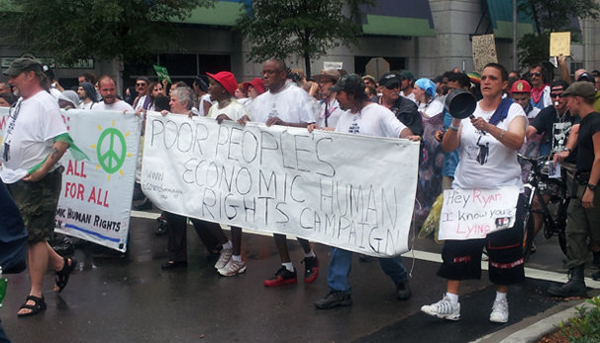
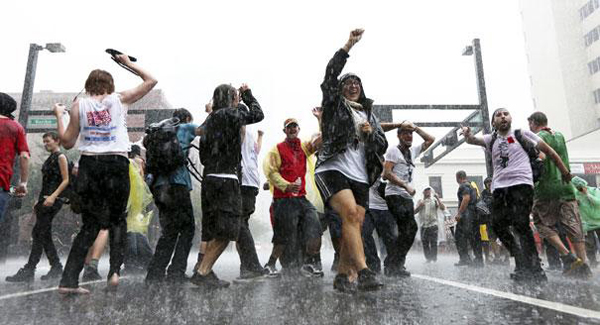
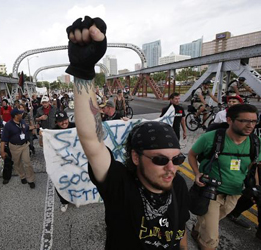
![]()
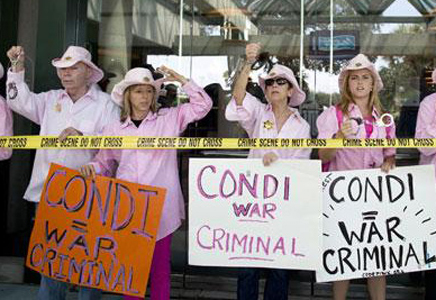

![]()
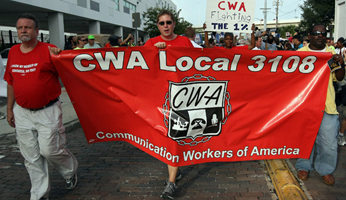
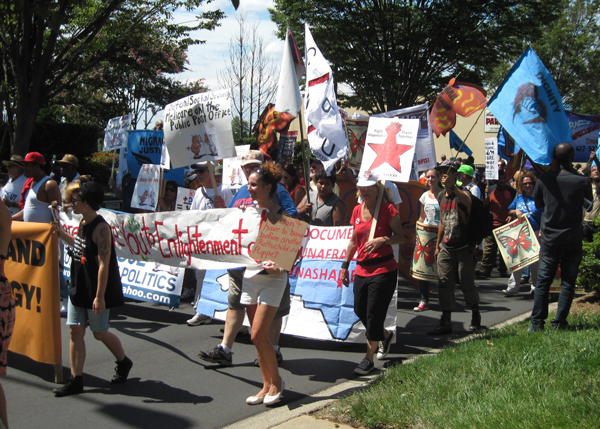
[TOP]
